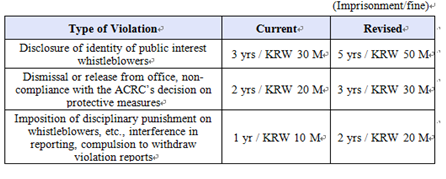Anyone who retaliates against public interest whistleblowers faces payment of damages up
- Date2018-01-22
- Hit1,231
“Anyone who retaliates against public interest whistleblowers faces payment of damages up to three times the actual loss suffered”
The ACRC promulgated the revised Act on the Protection of Public Interest Whistleblowers, which stipulates punitive damages, shift of the burden of proof, and emergency relief funds, etc.
□ From this year on, anyone who takes retaliatory or disadvantageous measures such as unfair dismissal, etc. against public interest whistleblowers by reason of reporting public interest violations should pay damages of up to three times the loss that public interest whistleblowers personally suffered.
On top of this, in case where there is a dispute regarding whether disadvantageous measures are legitimate, a person who takes the disadvantageous measures will be required to prove the legitimacy of such disadvantageous measures, and relief funds will be more expeditiously provided to public interest whistleblowers.
The Anti-Corruption and Civil Rights Commission (ACRC, Chairperson Pak Un Jong) announced that the revised Act on the Protection of Public Interest Whistleblowers stipulating the aforementioned is slated to be in force from May 1, 2018.
□ Under the revised Act, the scope of areas subject to public interest whistle-blowing has been expanded by newly adding an area of ‘equivalent public interest’ to the existing five areas (i.e. the public health, safety, environment, the interests of consumers, and fair competition). Also, the Defense Acquisition Program Act and the Financial Investment Services and Capital Markets Act have been incorporated into the scope of laws subject to the public interest whistle-blowing.
In addition, in order for public interest whistleblowers to be prepared enough to file for protective measures to the ACRC, the period needed for the application for protective measures has been extended from three months to one year. And in case where a public interest whistleblower files for the ACRC’s decision on protective measures or files a lawsuit in the court, a ‘person who puts the whistleblower at a disadvantage’ rather than the whistleblower will have to bear the burden of proof of the legitimacy of the disadvantageous measures so that the burden of whistleblowers can be more eased.
Furthermore, with a view to supporting whistleblowers in meeting their urgent needs, the system of ‘emergency relief funds’ has been introduced, with legal grounds for providing emergency relief funds being established. And the ‘system of punitive damages’ has been also incorporated into the revised Act to have those taking disadvantageous measures pay punitive damages of up to three times the actual loss suffered by whistleblowers.
On the other hand, the provision of criminal penalties has been more strengthened, so anyone who violates the revised whistleblower protection Act will face up to five years in jail or a fine of up to KRW 50 million.
□ An official from the ACRC said “since the scope of public interest reporting has been expanded and the level of protection of and support for whistleblowers has been more strengthened through this revision, I expect that public interest whistle-blowing, especially the internal one, will be more facilitated.”










